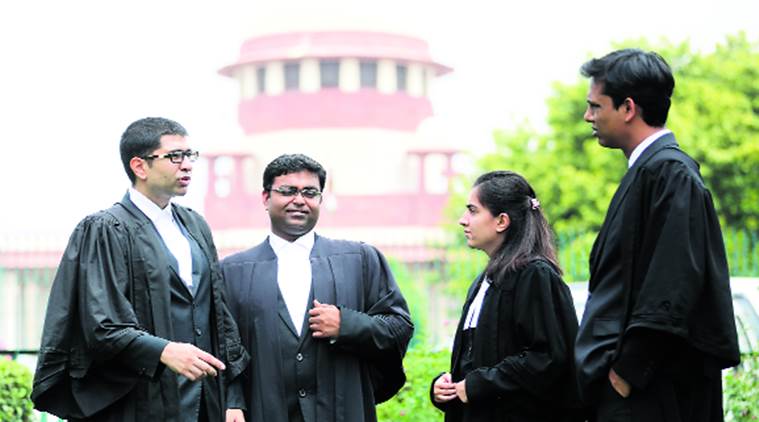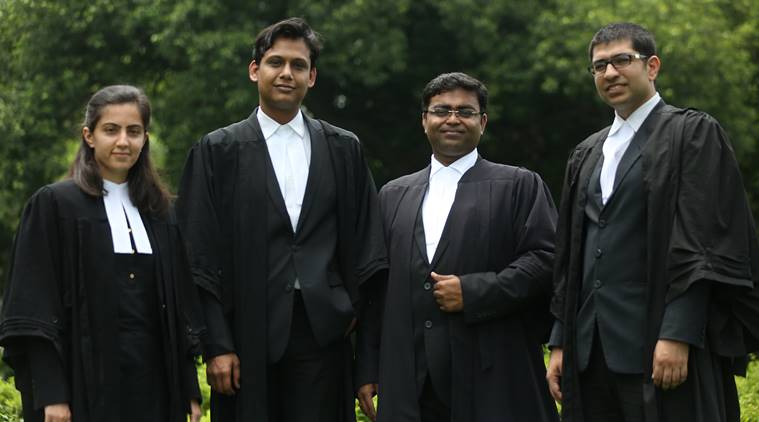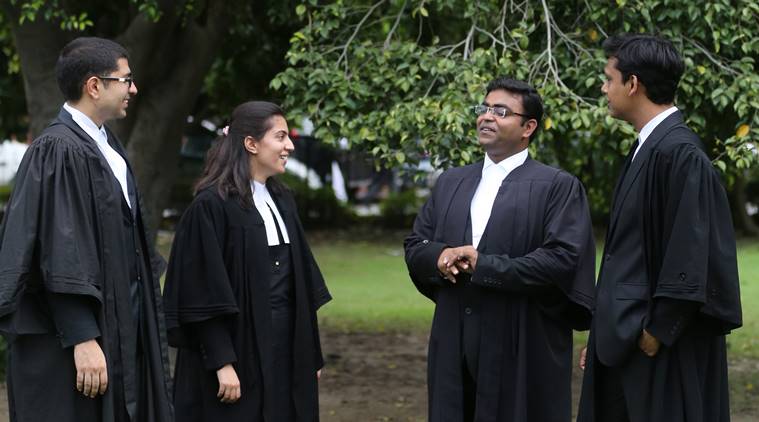Prasanna believes that technology ruling lives can only be deemed as fair if it is “proveably so and nothing in Aadhaar has been able to convince me of that”.


(From left) Gautam Bhatia, Prasanna S, Kritika Bhardwaj and Apar Gupta outside the Supreme Court. Tashi Tobgyal
AS THE Supreme Court examines whether privacy is a fundamental right, a community of young lawyers has taken it upon themselves to spread the word — that the right to privacy is “non-negotiable”. So, from sitting through every court hearing to live-tweeting proceedings, from taking on the Centre when it argues that the Constitution does not provide for privacy as a fundamental right to breaking down the web of legalese around the debate, these lawyers are trying to help shape the architecture that will govern Indian lives in the age of unique IDs, technology and machines.
Prasanna S, Apar Gupta, and Kritika Bhardwaj are assisting senior counsel Shyam Divan, who is representing four privacy petitioners, including Shanta Sinha, the former head of the National Commission for the Protection of Child Rights, and Magsaysay awardee Bezwada Wilson. Gautam Bhatia is assisting another senior lawyer, Arvind Datar, who is arguing for the Election Commission and for privacy as a fundamental right.
There are seven petitioners in the case with at least 12 active counsel in the matter before the nine-judge bench.
Prasanna S, 34
The Hosur-born, Tamil-speaking Prasanna sees nothing exceptional about his transition from the world of software to the thickets of Constitutional law four years ago. “Many technologists have moved to fields like investment banking. No questions are asked of them,” says Prasanna, now an independent, Delhi-based lawyer. Prasanna, who is also a trained Carnatic singer, believes his background in software and technology gives him “at least the vocabulary to understand new challenges to civil liberties”.
“Many technologists have moved to fields like investment banking. No questions are asked of them,” says Prasanna, now an independent, Delhi-based lawyer. Prasanna, who is also a trained Carnatic singer, believes his background in software and technology gives him “at least the vocabulary to understand new challenges to civil liberties”.
He says the general lack of opposition among the public to ideas such as Aadhaar, the unique ID programme that is at the core of the privacy debate, stems from a “fascination with technology” and a belief “that if it is a machine, it will make correct choices”.
Nothing could be more flawed, he says. “I can see through that clearly, being fully aware of how technology can have design limitations,” says Prasanna. In the case of biometrics, Prasanna says, “With an error-rate higher than 10 per cent, if this flawed technology rejects the population the size of the state of Bihar as being ineligible for rations, what is to be done? Is that acceptable?”
Prasanna believes that technology ruling lives can only be deemed as fair if it is “proveably so and nothing in Aadhaar has been able to convince me of that”.
 The lawyers photographed on the central lawns of the Supreme Court in New Delhi. (Express Photo by Tashi Tobgyal)Gautam Bhatia, 28
The lawyers photographed on the central lawns of the Supreme Court in New Delhi. (Express Photo by Tashi Tobgyal)Gautam Bhatia, 28
The Rhodes scholar is also a sci-fi geek. He edits Strange Horizons, a UK-based science-fiction magazine, and is now looking at post-colonial science-fiction. One of the lawyers on senior counsel Datar’s team, he is among the leading voices in the privacy debate, even live-tweeting the apex court’s proceedings. Bhatia was studying for a degree in legal philosophy at Yale when WikiLeaks broke, followed by Edward Snowden’s revelations in June 2013. In December 2013, the American Civil Liberties Union filed a law against surveillance and Bhatia took a train to the New York district court to hear ACLU fight the US National Security Agency for two-and-a-half hours.
After he returned to India, his alma-mater, the National Law School in Bengaluru, asked him to do a paper on surveillance in the Indian context. To Bhatia, that was a “golden moment”, when his academic pursuits and events at home and abroad got him interested in data, meta-data and privacy concerns. Bhatia believes that Aadhaar in itself is not a surveillance mechanism, but has the “potential” to be one. “If information is in different silos, the seeding of databases is okay, but the minute you combine it, then you are very well placed to be a perfect surveillance state,” he says.
Gautam speaks of how metadata gives you a deeper insight into people than actual data. “If you tape my phone conversation, you get data, but if you know who I called, who I had coffee with, visited a doctor, a divorce consultant and a physiotherapist… that gives you much more data to map me with near perfection,” says Bhatia, who is the author of Offend, Shock or Disturb: Free Speech Under the Indian Constitution.
So what is an ideal right to privacy law? “Any law on privacy has to be founded on principles of informed consent and specific consent. Informed consent means the person is aware of what use it’s being put to and specific consent means that the authorities must seek consent for each specific act.”
Gautam thinks a national political culture that does not value privacy can only go one way. “Look at history — societies where privacy is devalued become totalitarian. East Germany, with its Stasi (Ministry of State Security that carried out mass surveillance), was not a strong state, but a state where the national political culture is such that privacy does not count, becomes a surveillance state,” he says.
Gautam believes that violation of privacy enables discrimination. “Bezwada Wilson has spoken of how manual scavengers do not want to be identified, nor do people like trafficked women who have been freed. Too much data about citizens with the state is anti-democratic.”
 There are seven petitioners in the case with at least 12 active counsel in the matter before the nine-judge bench. (Express Photo by Tashi Tobgyal)Apar Gupta, 33
There are seven petitioners in the case with at least 12 active counsel in the matter before the nine-judge bench. (Express Photo by Tashi Tobgyal)Apar Gupta, 33
@Aparatbar is a familiar Twitter handle to serious followers of the privacy and data debate in India. Gupta says he operates in the space between the “polar worlds of rockstar litigant Harish Salve and Prashant Bhushan, who does public interest litigation”.
A product of Columbia Law School and before that, Mount St Mary’s school in Delhi, Gupta says, “It is true society will be incredibly digital, but if you divorce it from civil rights and constitutionality, you will get something very unjust. We want to push this back.”
So why would governments want Aadhaar to be made compulsory when they have passports and PANs? “There is an administrative fetish, which is fed by Aadhaar. (Governments) get a digital dashboard and are able to create the illusion that they are administering efficiently. It’s on a good-faith basis to some degree, but all digitisation is not good. Digital IDs by themselves have resulted in savings, but that has been without Aadhaar. Conservative estimates are that nearly Rs 11,000 crore has been spent on Aadhaar,” he says.
Kritika Bharadwaj, 26
She is currently reading three books: Delete, on the Right to be Forgotten, The Second Sex by Simone De Beauvoir and Seven Minutes, a courtroom thriller. But Kritika, a political science graduate from LSR, went on to do an LLB from Delhi University’s Faculty of Law and later Masters from Cambridge in Information Law. But even before her Masters, she had cut her teeth on Aadhaar-related matters and done meticulous research on international laws, biometrics, international practices, protocols and databases in the world.
“We were shocked by the Centre’s arguments that privacy is not a fundamental right. We had prepared things pertinent to Aadhaar, of projects, exclusion and biometrics. But when the government made this plea, we all sat up and decided to help push this back,” she says.
Yet, she says, the “real challenge to us is the ‘so what’ challenge. “So what if privacy is violated, people say. We are still trying to address that convincingly,” she says. “My understanding and study tells me that the real worry is that the citizen does not even know what the government knows about him and how it will be used against the citizen. That is a lot of information asymmetry. Also, with so much data about everyone, there is implicit, a presumption of guilt of each citizen,” she says.
http://indianexpress.com/article/india/rhodes-scholar-to-carnatic-singer-meet-4-young-lawyers-in-privacy-fight-4785544/
August 7, 2017 at 9:52 pm
The lawyers have taken a commendable step in representing people on the right to privacy issue. The case of aadhar must be explained to people in the country